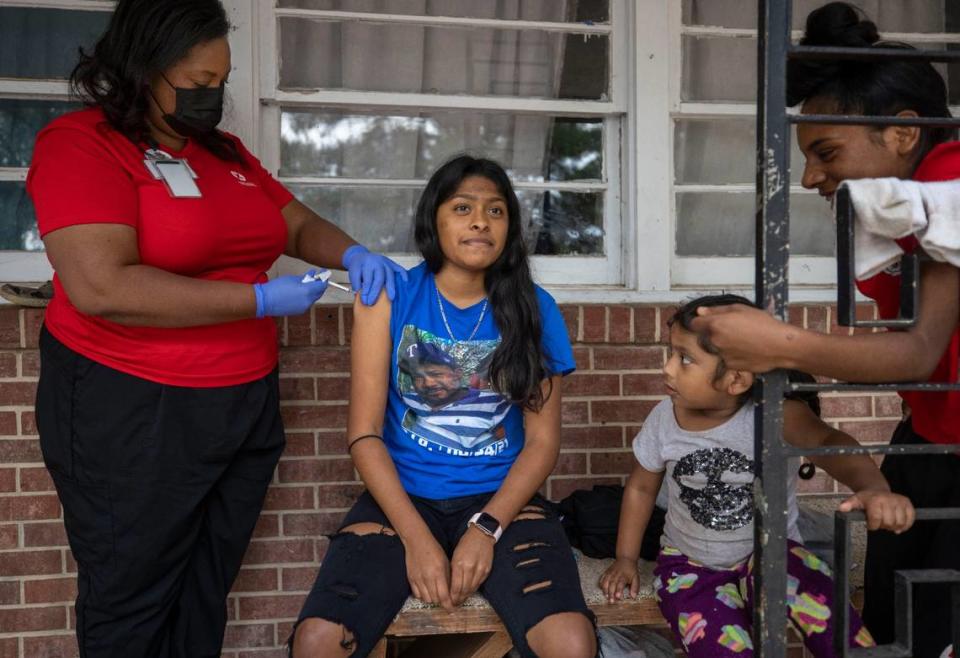Adults can now get the RSV vaccine. Here’s who should get the shot and when
Respiratory syncytial virus, usually shortened to RSV, is a common respiratory virus that can cause mild, cold-like symptoms. While most people recover within a couple weeks, the illness can be severe for infants and older adults, sometimes requiring hospitalization.
Earlier this year, the CDC approved an RSV vaccine for adults, adding another shot to combat the “tripledemic” we were in last winter between COVID, the flu and RSV.
Unlike COVID and the flu, medical professionals are not encouraging everyone to get vaccinated against RSV. In fact, only a handful of the population should get this vaccine.
Here’s what to know about who should get the vaccine and when.
Who should get an RSV vaccine?
Only a small portion of the population should get an RSV vaccine.
• This includes people who are 60 and older who have compromised immune systems and/or heart problems who would be deeply impacted by a flu-like virus, said UNC Health’s Dr. David Wohl.
• Young children and pregnant people can also be candidates for RSV vaccines. Talk to your doctor to see if the RSV vaccine is right for you.
Note: RSV vaccines typically last two years, and they are not to be taken annually.
"Getting your #COVID19vaccine has become a part of regular health care that's recommended for everyone." - Dr. Charlene Wong of @DukeHealth
Visit https://t.co/5TmKuLEGfu to learn more about #COVID19 vaccines, testing and treatment. pic.twitter.com/y04c6ZDM55— NCDHHS (@ncdhhs) June 2, 2023
Do you also need a COVID and flu vaccine if you’re getting an RSV vaccine?
Yes.
The RSV vaccine only protects against severe illness caused by RSV, while flu and COVID vaccines do the same thing against their respective illnesses.
Both COVID and flu vaccines are recommended for the majority of the population older than 6 months of age.

When should you get an RSV vaccine?
Now.
The Centers for Disease Control and Prevention recommend getting vaccinated against COVID, the flu and RSV in September or October, recommending people get all necessary vaccines before November hits.
The latest COVID vaccine will be available in pharmacies and doctor’s offices within the next few weeks, so if you don’t need a vaccine immediately, it would be best to wait a few weeks before your COVID immunization.
The latest vaccine will protect against the most recent strains of COVID, though any vaccine will help fight severe cases of the illness, UNC’s Wohl said.
Routine vaccinations, including #COVID19vaccines, are key to taking care of yourself and your community. Visit https://t.co/5TmKuLEGfu to find a vaccine provider. #DontWaitToVaccinate pic.twitter.com/pRmwpKylzx
— NCDHHS (@ncdhhs) June 3, 2023
Are RSV, COVID, flu shots free?
Yes, with insurance.
Flu shots are widely available for free, and many pharmacies offer walk-in appointments for them at no charge.
Blue Cross Blue Shield, North Carolina’s largest health insurance carrier, covers “both the cost of the vaccine and vaccine administration at 100%” when members receive the COVID and/or flu vaccine with an in-network provider, said spokesperson Laura Eberhard.
This is available to nearly anyone who has insurance, as these vaccines are recommended for everyone older than 6 months old.
RSV vaccines are also covered for children up to 19 months old and for adults age 60 and older when Blue Cross patients see in-network providers.
Here are the 3 shots you need to get this fall — and when to get them

